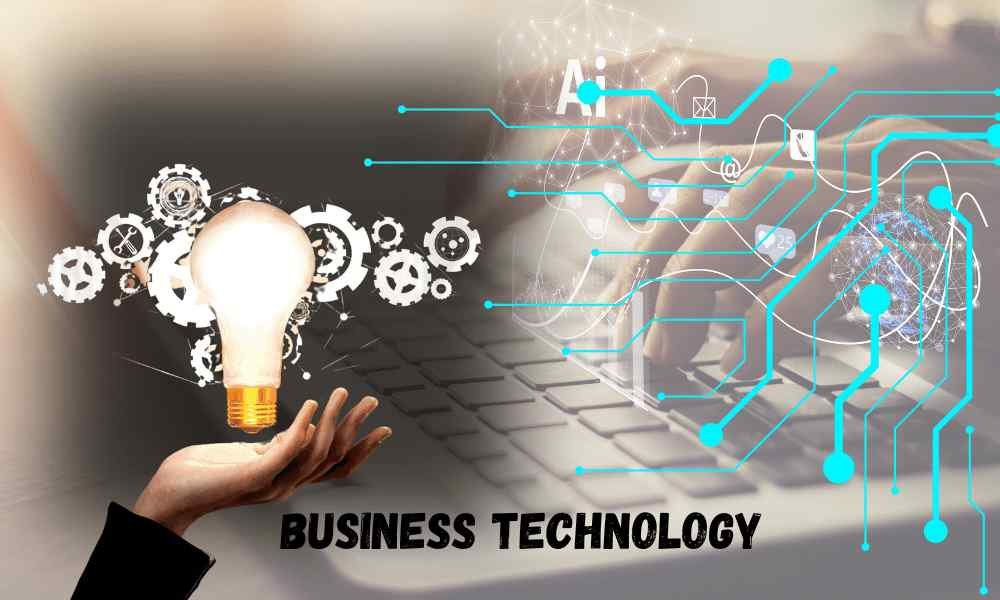Business era refers back to the application of various tools, systems, and tactics to decorate the efficiency. Productivity, and competitiveness of a commercial enterprise. It incorporates a huge variety of virtual answers and techniques aimed at enhancing unique components of operations. From customer support to internal tactics.
Business technology encompasses the usage of digital equipment and systems to streamline operations, enhance verbal exchange, and enhance decision-making inside an company. It consists of hardware, software, networks, and information control answers tailor-made to satisfy the unique desires of groups across numerous industries.
Role of Technology in Business:
Technology performs a essential role in current commercial enterprise operations, riding performance, innovation, and competitiveness across industries. Furthermore, from streamlined communication to automated techniques, technology empowers agencies to optimize their workflows. In present day digital age, companies leverage a huge range of technology, together with cloud computing, statistics analytics, artificial intelligence, and IoT, to beautify choice-making, patron studies. Additionally, technology enables corporations to conform to changing marketplace dynamics rapidly, respond to client desires efficaciously. And live ahead of the opposition. Moreover, it enables collaboration and connectivity, allowing teams to paintings seamlessly throughout geographies and time zones. As groups hold to adapt and include virtual transformation. The position of era in riding growth and fulfillment will become an increasing number of fundamental, shaping the destiny of commercial enterprise operations and innovation.
Business Capabilities and Transformation
Business technology plays a pivotal position in permitting corporations to convert their abilties and adapt to evolving market needs. Moreover, through the strategic implementation of technology solutions, groups can optimize tactics, drive innovation, and advantage a competitive part in the market. This strategic integration not simplest complements efficiency but additionally fosters agility, allowing corporations to unexpectedly respond to converting business landscapes.
Digital Frontline
The digital frontline refers to the interface among a business and its clients or clients. It encompasses diverse technology such as websites, mobile apps, and social media platforms that facilitate communication, transactions, and engagement with the target audience.
Technology Backbone
The generation backbone of a business accommodates the foundational infrastructure and systems that aid its operations. This consists of hardware additives like servers and networking equipment, in addition to software applications for statistics storage, security, and connectivity.
Technology Domains
Business era can be labeled into exceptional domains based totally on its primary function and impact on operations. To problematic, those domain names embody consumer interfacing era, which focuses on enhancing interactions and studies with clients. Additionally, there’s product generation, emphasizing the technological components related to the improvement and improvement of products. Moreover, operational generation plays a vital role in optimizing inner procedures and structures inside an employer. Lastly, enterprise method technology streamlines and enhances common workflow performance. This category provides a complete framework for expertise how various aspects of generation make contributions to the multifaceted landscape of present day enterprise operations.
Customer Interfacing Technology
Customer interfacing generation encompasses the equipment and structures used to have interaction with and serve clients. Notably, this includes consumer courting management (CRM) structures, on-line support portals, and self-provider kiosks designed to beautify the consumer enjoy. By leveraging these technology, corporations can foster seamless communique, advantage precious insights into client choices, and in the long run build more potent and greater personalised relationships. Additionally, those tools contribute to usual consumer satisfaction, making sure that agencies live attuned to evolving client needs in contemporary dynamic market landscape.
8. Product Technology
Product era refers back to the digital solutions and improvements included into the improvement, manufacturing, and distribution of merchandise. This includes software program for layout and prototyping, as well as technology like automation and 3-D printing.
Operational Technology
Operational era, a key component in cutting-edge enterprise strategies, specializes in optimizing inner procedures and workflows inside an organization. This class encompasses crucial tools, inclusive of employer resource making plans (ERP) systems, inventory management software, and deliver chain optimization gear. By strategically enforcing those technologies, companies can systematically decorate efficiency, streamline operations, and minimize prices. Additionally, the mixing of operational era contributes to actual-time statistics insights, fostering knowledgeable selection-making and flexibility. This proactive approach guarantees that corporations are nicely-located to navigate the complexities of cutting-edge dynamic business environment.
Business Process Technology
Business method era revolves around the automation and optimization of key commercial enterprise techniques, in the end using performance and productiveness. This encompasses a number gear, together with workflow control systems, business process modeling equipment, and robot system automation (RPA) answers. These equipment work in tandem to streamline operations and appreciably reduce manual effort.
Emerging Technologies
This segment may want to explore the present day improvements and traits in business generation, including emerging technologies which have the ability to revolutionize industries. It may want to discuss subjects including artificial intelligence, system studying, blockchain, Internet of Things (IoT), and augmented reality, and their packages in numerous business domain names. The focus might be on how those technology are reshaping commercial enterprise approaches, client interactions, and product/carrier offerings, and how corporations can adapt to harness their capacity for aggressive advantage.
Data Analytics and Business Intelligence
This section ought to delve into the significance of information analytics and commercial enterprise intelligence equipment in leveraging data for informed choice-making. It should cover subjects which include records series, analysis, visualization, and predictive modeling, highlighting how agencies can extract treasured insights from their information to force strategic projects and improve overall performance.
Cybersecurity and Risk Management
Cybersecurity is a essential aspect of enterprise technology, especially in present day virtual landscape where facts breaches and cyber threats are established. This phase could speak the importance of enforcing sturdy cybersecurity measures to shield touchy records, safeguard towards cyber assaults, and make certain compliance with information safety rules. It can also comment on chance management techniques for identifying, assessing, and mitigating capacity risks associated with generation adoption and utilization.
Cloud Computing and SaaS Solutions
Cloud computing has changed the way organizations operate by providing scalable and cost-effective IT infrastructure and software design answers. This section seeks to explore the benefits of cloud computing, including flexibility, scalability, and accessibility, in addition to infrastructure as a service (IaaS), platform as a service (PaaS), and cloud services as software (SaaS). ) around. The agency can also speak on hosted software as a service (SaaS) solutions for a number of commercial enterprises including resource management systems (ERP), patron dating management (CRM), and collaboration tools
Mobile Technology and Remote Work
Mobile technology has emerge as increasingly more indispensable to business operations, permitting personnel to work remotely and get admission to crucial assets from anywhere. This phase could discuss the effect of cellular technology on team of workers mobility, productivity, and collaboration, as well as the demanding situations and possibilities related to remote paintings arrangements. It can also explore the function of cell apps, cellular devices, and mobile-friendly structures in facilitating seamless verbal exchange and workflow management in a allotted staff.
Conclusion:
The integration of era into business operations is vital for driving growth, efficiency, and innovation. From improving communique to automating techniques, technology empowers agencies to conform to the evolving marketplace landscape and deliver cost to customers. As companies retain to embrace virtual transformation, the role of technology will become even more big in shaping the future of trade. By leveraging emerging technology and embracing a tradition of innovation, groups can live agile, competitive, and resilient in today’s dynamic environment. Furthermore, era enables collaboration, connectivity, and scalability, allowing agencies to scale their operations and reach new markets efficaciously. As we circulate ahead, companies have to maintain to invest in technology and include virtual techniques to liberate new opportunities and pressure sustainable increase. Ultimately, era isn’t only a device but a catalyst for driving enterprise achievement and enabling corporations to thrive in the digital age.
FAQs:
What are some of the most important types of business technology?
Common examples include cloud computing, cybersecurity solutions, data analytics tools, enterprise resource planning (ERP) systems, and communication & collaboration platforms.
How can business technology help my company?
It can streamline operations, improve efficiency, enhance communication, gain data-driven insights, and gain a competitive edge.
What are the biggest challenges businesses face when implementing new technology?
Challenges include cost, security concerns, integration with existing systems, user adoption, and choosing the right technology for their needs.
What are some key trends in business technology?
Answer: Trends include artificial intelligence (AI), automation, the Internet of Things (IoT), and the increasing importance of cloud-based solutions.
How can small businesses stay up-to-date with the latest business technology?
Researching online resources, attending industry events, and consulting with IT professionals are all helpful approaches.
Is it necessary for every business to have a dedicated IT department?
Not necessarily. Smaller businesses may outsource IT needs or utilize managed service providers (MSPs) for ongoing support.
What are some best practices for securing business technology?
Regular software updates, strong password policies, employee training on cybersecurity awareness, and data backup & recovery are crucial.
How can business technology be used to improve the customer experience?
Businesses can leverage technology to offer personalized interactions, self-service options, and efficient communication channels.
What is the role of business technology in the future of work?
Technology is likely to further automate routine tasks, allowing employees to focus on higher-level thinking and strategic decision-making.
Where can I learn more about specific business technology solutions?
Many software vendors offer detailed information on their websites, and industry publications often cover reviews and comparisons of various solutions.



